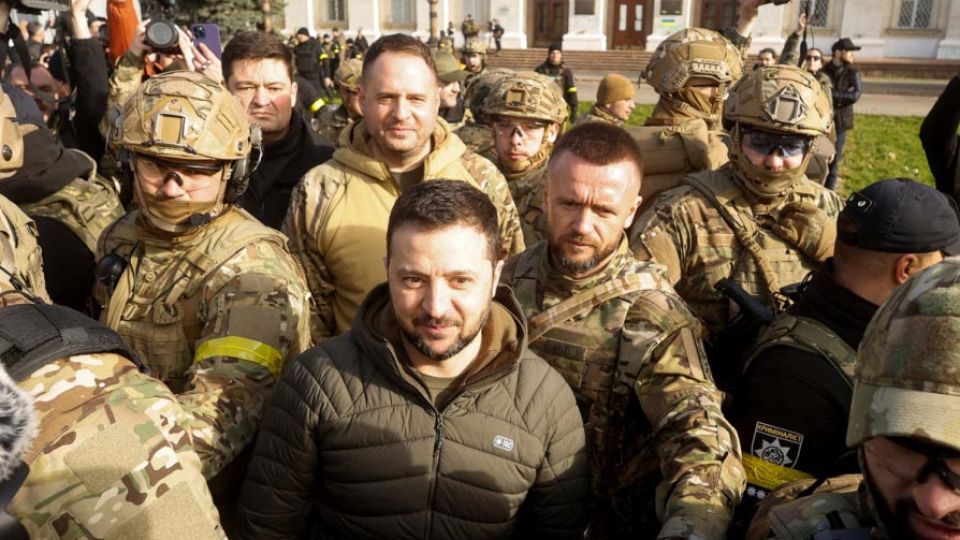November 17, 2022
DHAKA – Vladimir Putin has suffered major setbacks in Ukraine in the last few months, with a string of losses in the northeast, east and now in the south. While the loss of Kharkiv in the northeast and Lyman in the Donetsk region, and now the pull-out from Kherson, are portraying Russia as a frail aggressor, weakening further by the week, security analysts suggest the war is far from over in Ukraine.
The Russian retreat from Kherson and across the defensive bulwark of Dnipro River is being seen by some as a trap set for the Ukrainian forces to lure in Ukrainian troops for an attack. This could also be Russia utilising the harsh winter months to realign and recalibrate its strategy, troops and resources for a fresh assault in spring. And there is no denying that, operating past its capacity with over-stretched manpower and logistics, Russia is finding it difficult to hold its ground in Ukraine.
Moreover, Russia needs to realign its stakeholders, especially key Putin allies such as Chechen leader Ramzan Kadyrov and Wagner mercenary group founder Yevgeny Prigozhin. Both men have, in recent months, been openly critical of Russia’s military capability. Interestingly, Putin has allowed them to continue to do so, revealing their importance to the regime. After all, Wagner group goes around in Russian prisons recruiting convicts to fight in Ukraine, where the group has been operative since 2014. Meanwhile, Putin’s self-proclaimed “foot soldier” Ramzan Kadyrov and his pro-Russian Chechen militia Kadyrovtsy have been a part of the Russian invasion from the beginning. Given its military’s weakness and growing criticism at home, it has now become imperative for Putin to convince these two critical allies to keep supporting him.
But what of Ukraine? Until very recently, President Volodymyr Zelensky and his cabinet outright refused to enter into talks with Russia under Putin, and even as they budged after some pressure from the US, they placed five demands – highly unlikely to be met by Russia – as prerequisites for any discussion. The demands are, “Restoration of territorial integrity, respect for the UN Charter, compensation for all damages caused by the war, punishment of every war criminal, and guarantees that this will not happen again.”

However, Ukraine seems to be losing sight of the fact that in the wake of increasing global economic pressure, the West’s support cannot be taken for granted. “Ukraine fatigue” could potentially set in. While their Western allies have been united in favour of Ukraine, they are facing increasing difficulties in continuing to support the war. From France and Germany to Romania and the Czech Republic, Europe has been rocked by protests demanding better pay as savings vanish into thin air amidst of soaring inflation, while their governments pledge further funds and arms for Ukraine.
The prospect of a cold winter without adequate energy supply has also become a worrisome prospect. Take the case of Italy: the country’s new leadership under Giorgia Meloni has recently reiterated its support for Ukraine, while the government in September had asked the people to set their thermostats at 19 degrees Celsius to fight the ongoing energy crisis. Ally countries are gradually growing wary of the economic impact of the Ukraine war on their daily lives as their governments try to stave off further protests.
“Unless European governments effectively tackle war-induced inflation and socioeconomic hardship, public opposition to further assisting Ukraine is likely to increase,” Niklas Balbon, research associate at the Global Public Policy Institute (GPPi), wrote for Carnegie Europe.
An October report by IFOP, an international polling and research firm, suggested that public support in France for the Ukraine war has fallen from 71 percent in March to 67 percent in October. In Germany, it has fallen from 80 percent to 66 percent. Another poll in Italy revealed that public support had dropped from 57 percent to 43 percent.
And after the US midterm elections, how much the Biden administration will be able to deliver on its promises of support remains uncertain.
While Ukraine is witnessing better days, its successes and the recently gained foothold in Kherson – which will give it easy access to Crimea – might be tempting its fate. If Ukraine recklessly ventures into Crimea, further provoking Russia, it might not be seen in a positive light by the West and its people, and the consequences might not be favourable for the country, especially in view of current realities.
Russia’s position is now perhaps worse: if the country is not able to regain full support from its allies and turn around in the war, the outcome would be further humiliation for the Putin regime. And if the West is not able to lessen the war’s economic burden on its people, for how long it would be able to keep supplying Ukraine with weapons, funds and moral support also remains to be seen.
While all parties are locked in a tight spot, for the war to end, one party needs to flinch. But who will? Is it going to be the weakening Russia, the stubborn Ukraine or its Western allies – succumbing under mounting economic pressure? Only time will tell.
Tasneem Tayeb is a columnist for The Daily Star. Her Twitter handle is @tasneem_tayeb


